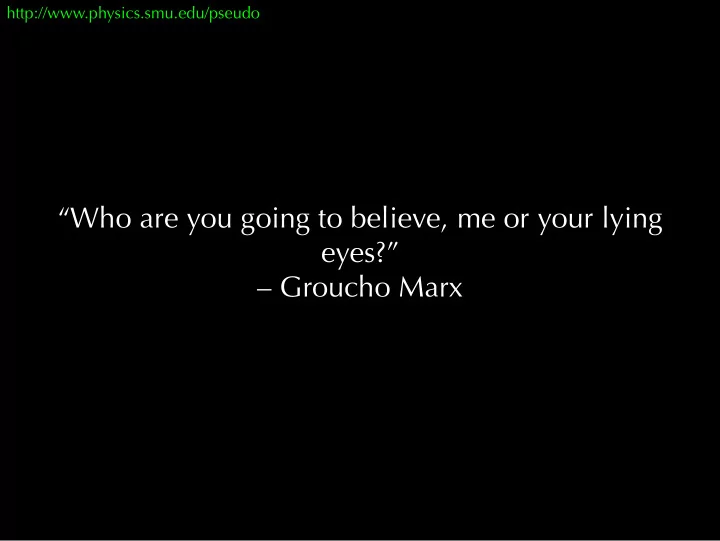

http://www.physics.smu.edu/pseudo “Who are you going to believe, me or your lying eyes?” – Groucho Marx
http://www.physics.smu.edu/pseudo Observation and Perception Supplementary Material for CFB3333/PHY3333 Professors John Cotton and Stephen Sekula February 1, 2012 Based on the following information on the web: http://www.physics.smu.edu/pseudo/Observ
http://www.physics.smu.edu/pseudo Eyewitness Exercise http://www.physics.smu.edu/devel/pseudo/Observ/description.html
http://www.physics.smu.edu/pseudo Advanced 3-D CGI HDR Rendering of Suspect
http://www.physics.smu.edu/pseudo Eyewitness Testimony ● In the pantheon of scientifc evidence, how does eyewitness testimony rank? ● in the legal system, it is considered a useful form of evidence and plays a central role in trials ● Eyewitness testimony is compelling, emotional evidence in the courtroom, but scientifcally it is the WEAKEST form of evidence. ● Witnesses can be completely sincere, completely sure of what they saw, and completely WRONG! ● Witnesses can also lie, but even when sincere they may not have seen what they claim to have seen.
http://www.physics.smu.edu/pseudo Observation and Perception
http://www.physics.smu.edu/pseudo The Scientifc Method A Brief Review ● Observation of a phenomenon ● what kind of observations? ● how reliable are the observations? ● Formulation of an hypothesis ● how does one begin to form a causal explanation for the phenomenon? ● what evidence is used to generate the hypothesis? ● how reliable is the evidence? ● Performance of experiment ● what means are available for testing different properties or ideas? ● how does one setup a reliable experiment? ● how does one gather information from the experiment?
http://www.physics.smu.edu/pseudo The Scientifc Method A Brief Review ● Observation of a phenomenon ● what kind of observations? ● how reliable are the observations? ● Formulation of an hypothesis ● how does one begin to form a causal explanation for the phenomenon? ● what evidence is used to generate the hypothesis? ● how reliable is the evidence? ● Performance of experiment ● what means are available for testing different properties or ideas? ● how does one setup a reliable experiment? ● how does one gather information from the experiment?
http://www.physics.smu.edu/pseudo Questions to Ask ● Are we “perfect observing machines?” ● if not, how might our perceptions be fawed or compromised? ● What assumptions enter into our perception?
http://www.physics.smu.edu/pseudo The Human Eye Vitreous humor Aqueous humor
http://www.physics.smu.edu/pseudo My Human Eye
http://www.physics.smu.edu/pseudo The Blind Spot Test
http://www.physics.smu.edu/pseudo A Movie of Many Optical Illusions http://www.youtube.com/watch?v=bOP37A1EhEs
http://www.physics.smu.edu/pseudo
http://www.physics.smu.edu/pseudo Kurt Wenner, Street Painting
http://www.physics.smu.edu/pseudo
http://www.physics.smu.edu/pseudo
http://www.physics.smu.edu/pseudo
http://www.physics.smu.edu/pseudo Questions to Ask ● Are we “perfect observing machines?” ● if not, how might our perceptions be fawed or compromised? ● What assumptions enter into our perception? ● our brains handle an onslaught of visual and audio stimuli by frst assuming nothing has changed since the last time we looked/listened (assume the status quo) ● paradigms, existing hypotheses or theories, etc.
http://www.physics.smu.edu/pseudo Paradigm ● A "paradigm" is a world view or perspective formed from known theories. ● For instance, once these were accepted as fact: – The sun and everything else went around the earth – Crop failures or other strange phenomena were caused by witchcraft, and it was moral to burn women accused of witchery – disease is caused by demons or bad air – the continents of the earth are fxed in place and the earth is unchanging – all matter is infnitely divisible into every smaller pieces, forming a “continuum” (the atomic theory of matter is only ~100 years old!)
http://www.physics.smu.edu/pseudo Pareidiolia ● When a vague or obscure stimulus is perceived as clear and distinct
http://www.physics.smu.edu/pseudo
http://www.physics.smu.edu/pseudo
http://www.physics.smu.edu/pseudo
http://www.physics.smu.edu/pseudo 1976 Viking orbiter image. 400 meters/pixel 1204x1056 pixels per raw image. This image is made after applying image processing techniques.
http://www.physics.smu.edu/pseudo
http://www.physics.smu.edu/pseudo
http://www.physics.smu.edu/pseudo 2001 Mars Global Surveyor, 2 meters/pixel resolution
http://www.physics.smu.edu/pseudo 2006 Mars Express, 13.7 meters/pixel
http://www.physics.smu.edu/pseudo
http://www.physics.smu.edu/pseudo
Recommend
More recommend